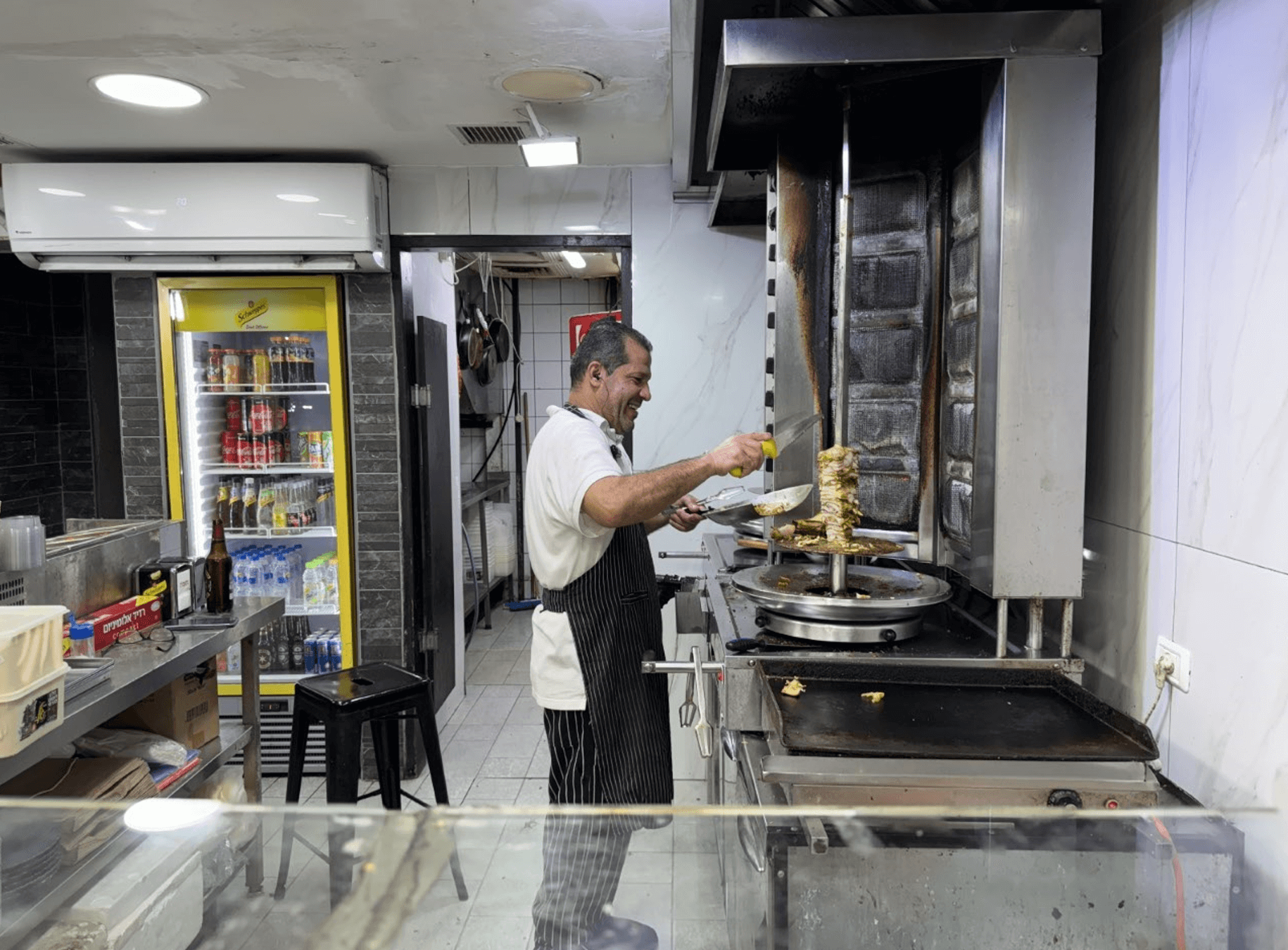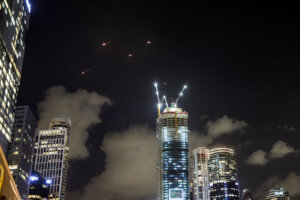A missile strike, a terror attack, and a falafel guy who is ready to serve
Rushing through the streets to reunite with her toddlers, a Tel Aviv mom gains new understanding of Israel

The falafel guy at Shula on October 1, 2024 in Tel Aviv, minutes after Iran’s ballistic missile attack on Israel concluded. Photo by Sophia Tupolev-Luz
TEL AVIV — The “all clear” sounds around 8:30 p.m., and I wait a few minutes before getting up from the blue plastic crate that I’m sitting on. I realize I’m surrounded by trash in the makeshift bomb shelter of a one-star hotel near the Tel Aviv beach — the closest possibility of safety to where I happened to be when the shooting started.
I need to get to my toddlers, who are with their father, who says there’s no food in his fridge. Obviously, there are no cabs. Deep breath. It’s a 25-minute walk inland. I shudder thinking about how, in addition to 200 ballistic missiles sent by Iran, there was a deadly terror attack on the streets tonight. Everything is closed, there is nowhere else to go and no other way — I have to get to my babies.
I speed-walk, heart on fire, hugging the wall of Trumpeldor cemetery, looking over my shoulder at the dark corners that seem to surround me. It’s eerily quiet after an hour of booms. On Bograshov, a main thoroughfare from the beach to the center of Tel Aviv, I see a familiar flash of blue. “What is this Wolt guy doing out here?” I think (Wolt is a ubiquitous Israeli food-delivery service).
Approaching Dizengoff, I replay in my mind every terror attack that has occurred on that street of cafes and shops. I have to cross Dizengoff to get to my children. I chastise myself for thoughts of its deadly history, deciding that I will not be afraid.
Weirdly, the corner of Bograshov and King George Street is brightly lit. I squint; it smells like fresh falafel. There is a man in a striped apron talking on his black wired headset and the spit full of shawarma is going around itself like normal. In a perfect orbit, as if that chopped-up spiced chicken hasn’t just witnessed the sky falling.
I stop in my tracks. I find myself stumbling to the counter, like a winded zombie, saying to the guy, “Are you…open?” It’s 8:45 p.m. “Yes, of course,” he says. “I don’t have pita, but what do you want in a laffa?” Iran just tried to wipe us out again, and this guy is apologetic for not having all his usual bread choices in stock.

The smell of the shawarma makes my brain start to wake up from that terrible chemical cocktail of fear, faith, anger, longing, loss, justice and surrender to the unknown. I order everything.
I ask the guy why in God’s name is he working, minutes after the “all clear.”
He says, “Huh?” He tells me, “I went to the shelter. Then I came back. When there’s a balagan” — chaos — “you need to hold your position. Doctors are working. The guy sweeping the street is working. People need to eat, so I’m working. Understand?” He looks at me like it should be obvious.
The shop has filled up with Israelis who it’s apparently obvious to as well.
So many people are working the night shift on this terrifying night. Our men and women on the front lines, of course. And the mothers and fathers raising the next generation of Israeli soldiers. Our street-sweepers, our spokespeople, our guy at Felafel Shula, feeding us as we emerge from the shelters..
This is what we mean when we say: Israel delivers, no matter what.
I start back out up the hill to Habima, Israel’s national theater, towards my children, swinging the yellow plastic bag full of hot fries, shawarma and falafel snug in those laffas. This time, I walk at a normal speed, even a tiny bounce in my step.



















